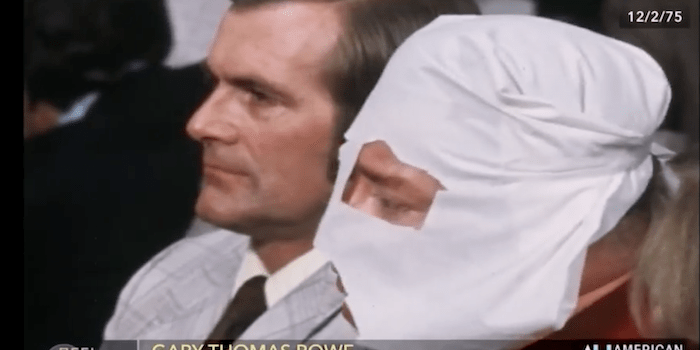(Ken Silva, Headline USA) On Dec. 2, 1975, the Church Committee heard former undercover informant Gary Thomas Rowe testify about the bureau’s undercover infiltration operations.
Rowe was a malodorous man—a former KKK member widely suspected of being an agent provocateur involved in church bombings, attacking protestors and even the murder of civil rights activist Viola Gregg Liuzzo.
It was later revealed that Rowe likely testified for the Church Committee out of spite because the FBI had stopped paying him to be an informant—as detailed in the book about his saga, The Informant: The FBI, the Ku Klux Klan, and the Murder of Viola Davis.
Nevertheless, his testimony was invaluable. He described how, as an FBI informant inside the KKK, he organized an assault on the 1961 Freedom Riders; how the bureau bugged the hotel rooms of activists such as Martin Luther King Jr.; and how FBI officials encouraged him to sleep with other Klansmen’s wives to sow discord within the group.
The New York Times wrote in July 1978 that Rowe “has forced the nation to take a hard new look at informers. How far should they be allowed to go? … And when an informant has nothing on which to inform, is it his job to provoke misconduct?”
But nearly 50 years later, Democrats are trying to discredit FBI whistleblowers with far cleaner records and reputations than Rowe ever had. Democrats on the House Weaponization Subcommittee released a 315-page report, attacking three FBI whistleblowers who provided information to committee Republicans.
The report, released Thursday, purports to debunk the whistleblowers’ allegations by quoting cherry-picked excerpts from the interviews they conducted with the Weaponization Subcommittee, which was formed to investigate FBI malfeasance.
The report does not include the full interview transcriptions, but the committee Democrats nevertheless claim that the interviews revealed the whistleblowers to be, in fact, disgruntled former bureau employees with a political axe to grind.
“These individuals, who put forward a wide range of conspiracy theories, did not present actual evidence of any wrongdoing,” the Democrat report said of the whistleblowers—retired FBI intelligence analyst George Hill, former special agent Stephen Friend and suspended special agent Garret O’Boyle.
Among the “conspiracies” pushed by the whistleblowers include questions about agent provocateurs in the Jan. 6 crowd, their push for the FBI to open a civil rights violation investigation into the murder of Ashli Babbit, and the accurate observation that Jan. 6 protestors did not kill any police officers.
One of the whistleblowers, Friend, responded to the attacks on his character in a series of tweets.
A thread on the latest efforts to intimidate and discredit whistleblowers.
— Steve Friend (@RealStevefriend) March 3, 2023
“Different people have different opinions about my motivations for bringing my whistleblower complaint forward. Here are the facts: I was an exemplary performer with multiple performance awards … During each meeting with my chain of command, managers stated that I had a great reputation within the FBI and admonished me that blowing the whistle could jeopardize a great career,” he wrote.
“I made that sacrifice because I believe I am doing the right thing in accordance with my oath of office. I just wanted to make the FBI a better place.”
Like Rowe did nearly 50 years ago, the three FBI whistleblowers may have the chance to testify at a future Weaponization Subcommittee hearing. The Democrats’ report urged the committee to have them testify publicly.
“The American public should be able to judge for themselves whether these witnesses or their allegations are remotely credible,” the report said.
Ken Silva is a staff writer at Headline USA. Follow him at twitter.com/jd_cashless.

